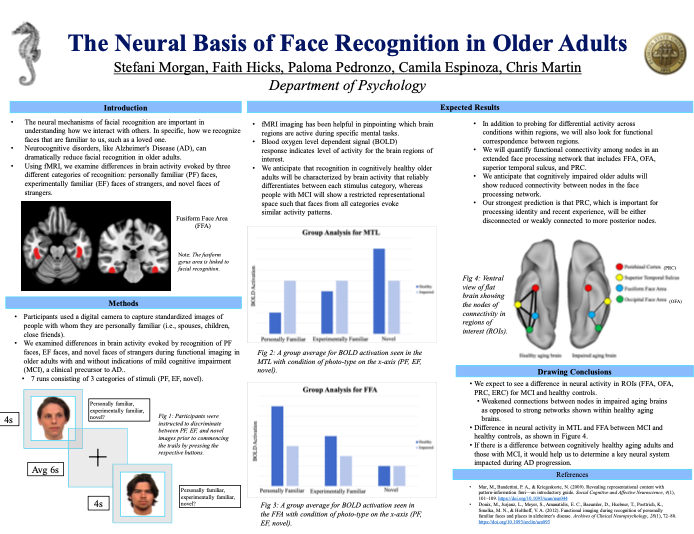Research Symposium
23rd annual Undergraduate Research Symposium, April 6, 2023
Camila Espinoza Poster Session 2: 1:30 pm - 2:30 pm/ Poster #244

BIO
I am interested in neuropsychology and cognitive neuroscience. I hope to work at a research lab after graduation to earn more experience working in that setting. Ultimately, I want to return to school to pursue my Ph.D. and conduct research.
The Neural Basis of Face Recognition in Older Adults
Authors: Camila Espinoza, Stefani MorganStudent Major: Psychology
Mentor: Stefani Morgan
Mentor's Department: Psychology Mentor's College: College of Arts and Sciences Co-Presenters:
Abstract
The ability to recognize a personally familiar face, such as a loved one, is a cognitive function used in everyday life. However, adults diagnosed with Alzheimer’s disease (AD) experience an impairment of this ability, which contributes to the negative impact AD has on quality of life. Here, we use functional magnetic resonance imaging to characterize differences in neural activity related to face recognition in older adults with and without indications of mild cognitive impairment (MCI), a clinical precursor to AD. More specifically, we examine differences in brain activity evoked by recognition of personally familiar faces, experimentally familiar faces of strangers, and novel faces of strangers. Participants used a digital camera to capture standardized images of people with whom they are personally familiar (i.e., spouses, children, close friends). Experimentally familiar faces were learned in a series of lab-based encoding tasks. All participants were asked to discriminate between the three categories of faces (personally familiar, experimentally familiar, and novel) during functional neuroimaging. We will use a pattern-based similarity analysis to quantify representational change among recognition signals for the different faces. We anticipate that recognition in cognitively healthy older adults will be characterized by brain activity that reliably differentiates between each stimulus category, whereas people with MCI will show a restricted representational space such that faces from all categories evoke similar activity patterns. If obtained, this difference between cognitively healthy aging adults and those with MCI would help us to determine a key neural system impacted during AD progression.
Keywords: neural basis, face recognition, Alzheimer's

